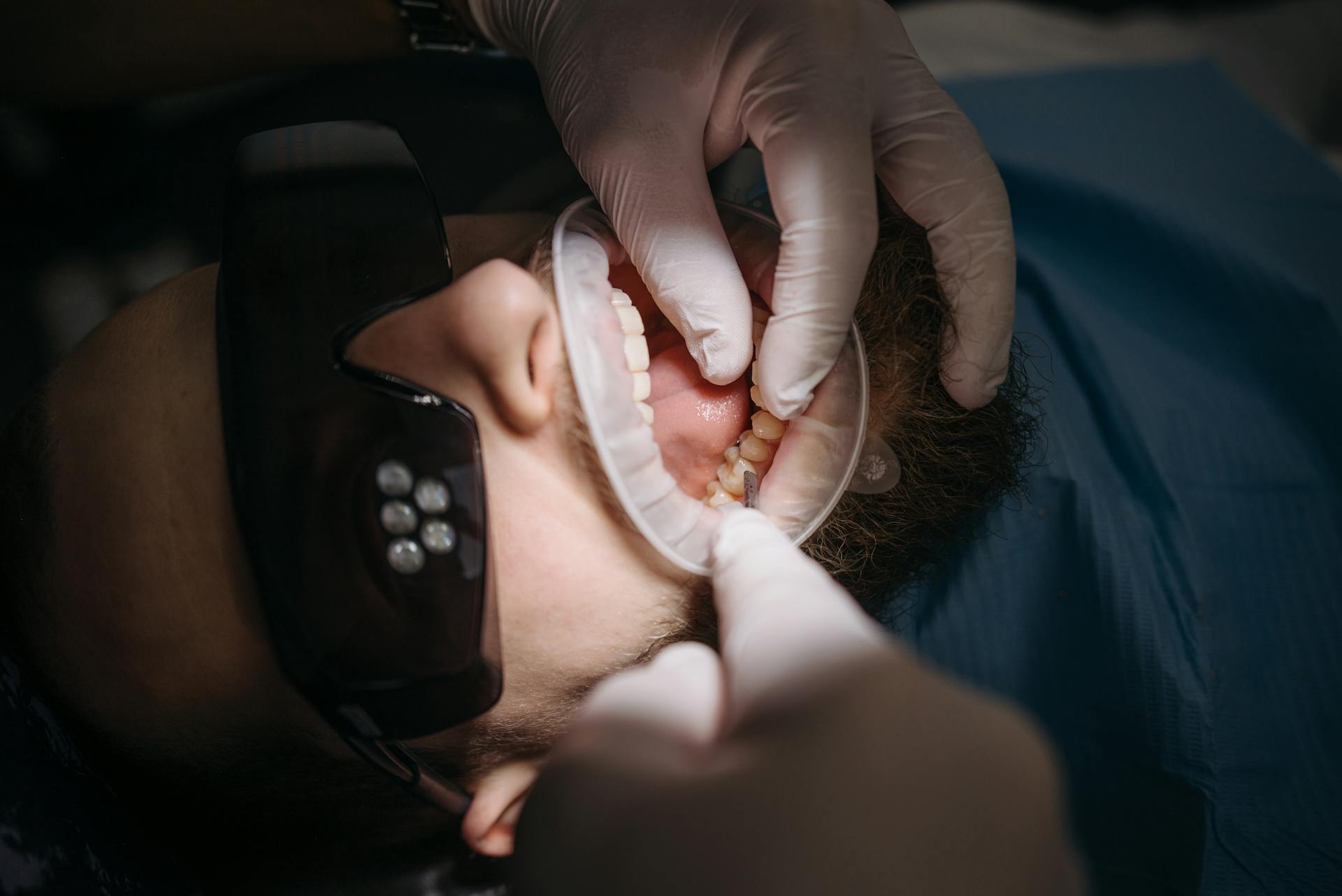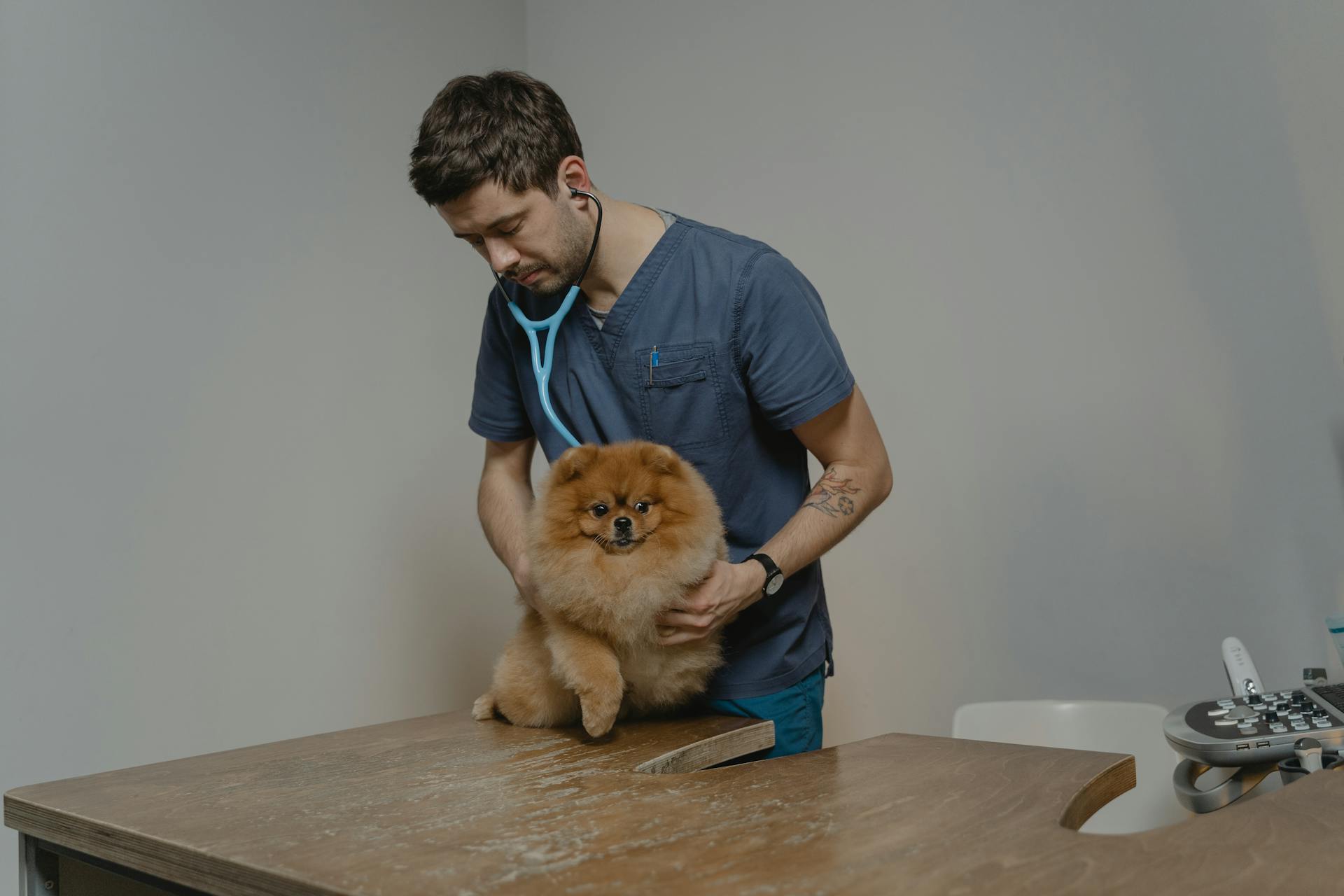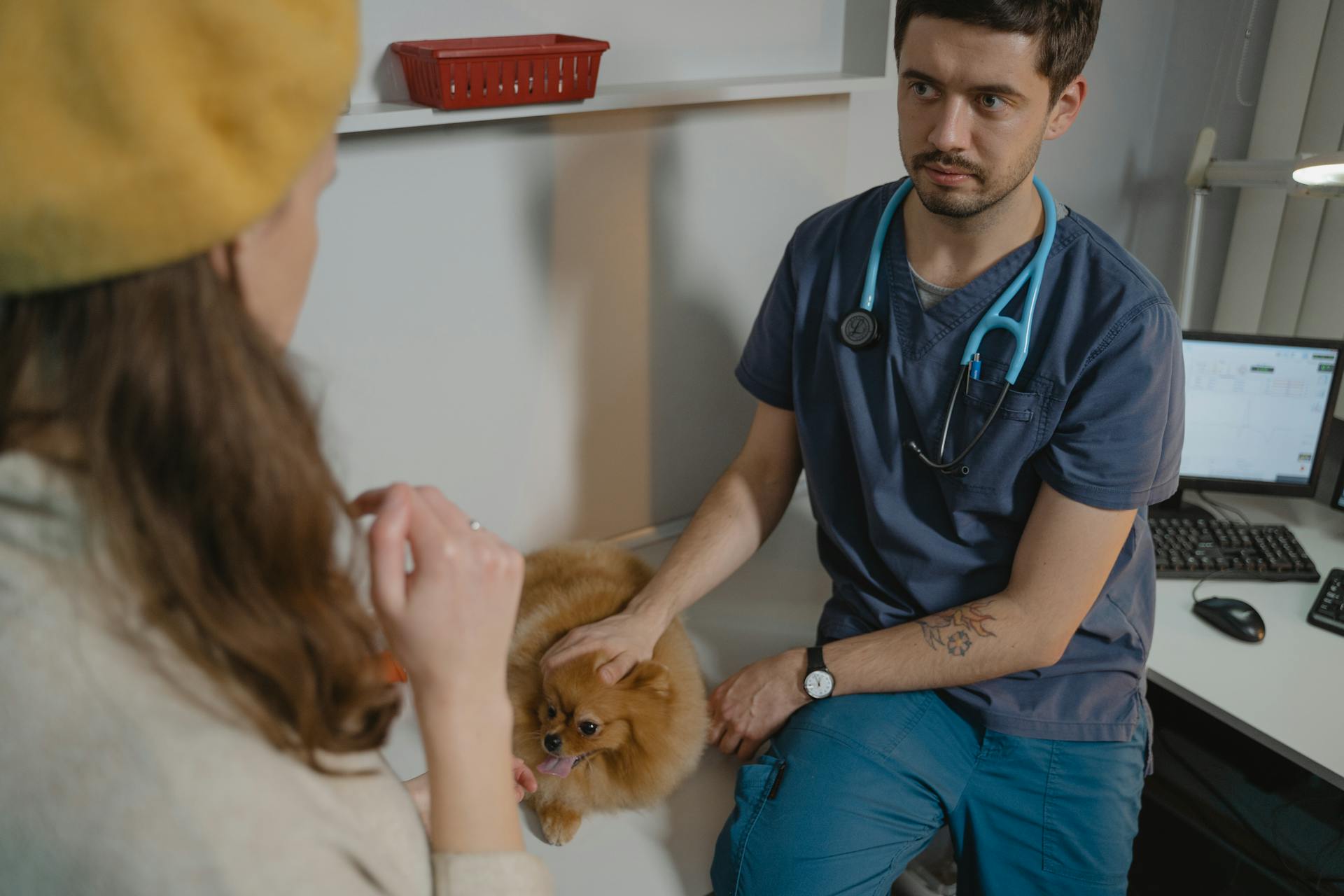
Maintaining your dog's oral health is crucial for their overall well-being. Regular dental care can prevent serious health issues like kidney disease and heart disease.
The Veterinary Oral Health Council (VOHC) recommends feeding your dog a dental diet to help reduce tartar and plaque. These diets are specifically designed to promote oral health.
Bad breath in dogs is often a sign of poor oral health. Regular brushing can help eliminate this issue and keep your dog's teeth clean.
What Is the VOHC?
The VOHC was conceived in the 1980s by veterinary dental professionals who recognized the need for an objective means of endorsing veterinary dental products.
The VOHC was formally established in 1997 to review and approve products that effectively reduce plaque and tartar in pets.
The VOHC's primary purpose is to set and maintain high standards for pet dental care products.
These products undergo rigorous scientific testing before earning the VOHC Seal of Acceptance.
The VOHC Seal of Acceptance was first awarded in 1998, and it's now recognized globally for promoting better dental health in pets.
The VOHC Seal of Acceptance
The VOHC Seal of Acceptance is a mark of excellence that ensures pet dental products meet rigorous criteria for efficacy in reducing plaque and tartar. This seal is awarded to products that have undergone extensive testing, including clinical trials conducted by independent researchers.
To earn the VOHC Seal of Acceptance, a product must demonstrate significant and reliable effectiveness in promoting dental health. The results of these trials are reviewed by the VOHC to ensure the product meets their stringent standards.
The VOHC Seal of Acceptance guarantees the efficacy of dental products in reducing plaque and tartar, key contributors to periodontal disease in pets. This seal provides pet owners with confidence in their purchase decisions.
Only products that have been independently verified to support their pet’s oral health and prevent serious dental issues receive the VOHC Seal of Acceptance. This assurance helps pet owners confidently select dental care products that genuinely benefit their pets’ well-being.
Worth a look: Pet Health Dog Tear Stain Remover
Using Approved Products Effectively
If you see the VOHC seal of acceptance on a product's label, you can feel confident in recommending that product to your clients for dental home care. Only 32 dog and 12 cat products have been approved by the VOHC.
Daily brushing is essential, and using VOHC-approved toothpaste and a pet-specific toothbrush will significantly improve your dog's oral health. Start slowly to get your pet accustomed to the process and gradually increase the duration.
VOHC-approved dental chews help reduce plaque and tartar buildup through mechanical action as your pet chews. Follow the recommended feeding guidelines on the product packaging.
Dental gels and sprays can be applied directly to your pet's teeth and gums to control plaque and tartar between brushings. These products are designed to be easy to use.
Incorporating VOHC-approved dental diets into your pet's regular meals can help clean their teeth while they eat. Ensure you follow the feeding instructions provided by your veterinarian or the product manufacturer.
Recommended read: Do Dog Dental Chews Work
Regular vet checkups are crucial, even with the use of VOHC-approved products. Schedule dental checkups with your veterinarian to maintain optimal dental health.
Here's a list of VOHC-approved products for dogs, categorized by type:
- Toothpaste: PetSmile Toothpaste (Supersmile) with calcium peroxide (Calprox)
- Dental chews: Greenies Dental Chews, Purina Pro Plan Veterinary Diets Dental Chewz, Virbac C.E.T. Enzymatic Oral Hygiene Chews
- Dental diets: Prescription Diet t/d Dental Health (Hill's Pet Nutrition)
- Water additives: Vetradent Biotrate (Dechra)
- Dental wipes: DentAcetic Dental Wipes (Dechra) with sodium hexametaphosphate, MAXI/GUARD Oral Cleansing Wipes (Addison Biological Laboratory) with zinc
Dog Oral Health Care
Dog Oral Health Care is an often-overlooked aspect of pet care, but it's crucial for maintaining your dog's overall health. Regular dental cleanings are necessary to remove tartar and plaque that can lead to gum disease and other issues.
Some dogs may need dental cleanings yearly, while others may require them every few years, depending on their breed and at-home dental care. Your veterinarian will recommend the best schedule for your furry friend.
Brushing your dog's teeth is a great way to prevent tartar buildup, and it's easier than you think. You can use a canine toothpaste, which comes in flavors like chicken, beef, and peanut butter, and a toothbrush specifically designed for dogs.
A different take: Free Dog Health Care
For small dogs, a baby toothbrush or fingertip brush is usually best, while large dogs can use a regular human toothbrush. Brush your dog's teeth 2-3 days a week, or daily if you have the time and your dog enjoys it.
Dental powder can also be added to your dog's meals to help prevent tartar and plaque. VetriScience Perio Support is a flavored powder that contains a probiotic to promote healthy bacteria in your dog's mouth.
Dental treats, such as OraVet chewable treats or Purina Pro Plan Veterinary Diets Dental Chewz, can also help reduce tartar buildup and freshen your dog's breath. Look for products with the Veterinary Oral Health Council's Seal of Acceptance.
If your dog has severe dental issues or is opposed to other options, your veterinarian may recommend a prescription dental food. These foods have been clinically proven to reduce dental disease and come in formulas for medium/large dogs and small dogs.
Here are some prescription dental food options to discuss with your veterinarian:
- Purina ProPlan Veterinary Diets DH Dental Health
- Hill's Prescription Diet t/d Dental Care Dog Food
- Royal Canin Veterinary Diet Dental formula
These foods are specially formulated to help reduce tartar buildup and promote healthy teeth and gums.
Understanding VOHC Protocols
The VOHC protocols are designed to ensure that products meet high-quality dental health criteria for pets. The protocols involve controlled clinical trials, where products are tested in a controlled environment to demonstrate their efficacy in reducing plaque and tartar.
The trials must be conducted by independent researchers and involve a sufficient number of pets to provide statistically significant results. The VOHC follows stringent protocols and standards to ensure that products meet their high standards.
Here are the key steps involved in the VOHC testing process:
- Controlled Clinical Trials: Products are tested in controlled clinical trials conducted by independent researchers.
- Plaque and Tartar Reduction: Products must show at least a 20% reduction in plaque and/or tartar to qualify.
- Scientific Validation: All data from clinical trials are subjected to thorough scientific review by the VOHC.
- Product Safety: Products must be safe for regular use by pets and must not cause any adverse health effects.
- Regular Reevaluation: Approved products are periodically reevaluated to ensure they continue to meet VOHC standards.
The VOHC protocols require that products demonstrate a significant beneficial effect in order to be granted the Seal of Acceptance. This ensures that pet owners can rely on VOHC-approved products to provide effective and safe dental care for their pets.
How the Works
The VOHC is a non-profit organization that grants a Seal of Acceptance to products that help control plaque and/or tartar in dogs and cats.

To get the Seal, a company must apply and submit scientific trials based on VOHC standard protocols, which are available on their website.
The VOHC doesn't perform research itself, it relies on the manufacturer to conduct the trials.
The company must submit their report and results to the VOHC for review.
If the VOHC is satisfied that the protocols were followed and the results show a significant beneficial effect, the product gets the Seal.
There are two designations available: controlling tartar or controlling plaque.
What Does STAND for?
STAND for?
STAND stands for Standards.
Protocols and Standards
The VOHC protocols and standards are designed to ensure that products meet high-quality dental health criteria for pets. The council follows stringent protocols and standards to evaluate the efficacy of products in reducing plaque and tartar buildup.
To be eligible for the VOHC Seal of Acceptance, products must undergo rigorous testing, including controlled clinical trials conducted by independent researchers. These trials involve a sufficient number of pets to provide statistically significant results.

The primary criteria for VOHC approval are the product's ability to significantly reduce plaque and tartar buildup on pets' teeth. Products must show at least a 20% reduction in plaque and/or tartar to qualify.
The VOHC also evaluates the safety of products, ensuring they are safe for regular use by pets and do not cause any adverse health effects. Approved products are periodically reevaluated to ensure they continue to meet VOHC standards.
Here's an overview of the VOHC protocols and standards:
The VOHC Seal of Acceptance is a trustworthy indicator of a product's ability to maintain and improve pet dental health. Pet owners can rely on VOHC-approved products to provide effective and safe dental care for their pets.
Sources
- https://www.ncbi.nlm.nih.gov/pmc/articles/PMC3058665/
- https://www.petmd.com/dog/general-health/dog-dental-care-6-ways-keep-dogs-mouth-clean
- https://www.dvm360.com/view/ultimate-guide-veterinary-dental-home-care
- https://www.dvm360.com/view/10-veterinary-dental-products-you-can-recommend-with-smile
- https://www.petful.com/pet-health/vohc/
Featured Images: pexels.com


